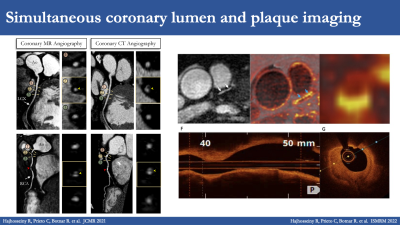Weekday Course
CMR Within the Myocardium
Joint Annual Meeting ISMRM-ESMRMB & ISMRT 31st Annual Meeting • 07-12 May 2022 • London, UK

| Myocardium CMR I | |||
| 09:15 | Novel CMR Methods to Characterize Coronary Microvascular Disease
Frederick Epstein
Coronary microvascular disease (CMD) is an important cause of myocardial ischemia, a central mechanism underlying heart failure with preserved ejection fraction, and an important risk factor for major adverse cardiac events and mortality. This presentation reviews pharmacological methods to modulate the coronary microvessels and their use in MR imaging to detect and quantify CMD. Specific methods covered include adenosine first-pass gadolinium-enhanced MRI, adenosine T1 mapping, arterial spin labeling, and LNAME T1 mapping. Studies applying these methods in obese and diabetic patients are reviewed, as are studies in animal models of CMD that investigate biological disease mechanisms and novel therapies.
|
||
| Myocardium CMR II | |||
| 09:45 | 19F MRI-Based Imaging of Thromboinflammatory Processes in Cardiovascular Diseases
Sebastian Temme, Patricia Kleimann , Pascal Bouvain, Arthur Zielinski, Jeny Koshy, Mina Yakoub, Florian Bönner , Christoph Jacoby, Francesca Baldelli-Bombelli , Karlheinz Peter, Xiaowei Wang, Jürgen Schrader, Johannes Stegbauer, Ulrich Flögel
Thromboinflammation is characterized by a close interaction of immune cells, platelets and components of the coagulation cascade. This impairs the systemic spread of pathogens, but can also foster the development and progression of cardiovascular diseases like deep vein thrombosis, atherosclerosis or myocardial infarction. Non-invasive visualization of thromboinflammation is challenging, because it requires the simultaneous imaging of thrombosis and immune cells. In this context, 19F MRI offers unique opportunities because of the large chemical shift range of the 19F-atoms and the availability of perfluorocarbons with individual spectral signatures that enables the visualization of thromboinflammatory processes by multispectral 19F MRI.
|
||
| 10:15 | Translational Molecular CMR of Inflammatory & Cell Fate Processes
Ulrich Floegel
The present talk demonstrates that both human and murine neutrophils can be specifically targeted to track their dynamic trafficking by non-invasive MRI in vivo. In clinical translation, this approach will allow not only to identify hidden origins of bacterial or sterile inflammation in patients but also to unravel cardiovascular disease states that are on the verge of severe aggravation due to enhanced neutrophil infiltration or activation.
|
||
| Myocardium CMR I | |||
| 10:45 |  |
Novel Contrasts & Characterizations of Coronary Architecture
Rene Botnar
Coronary artery disease remains the major cause of death in many western and developing nations. Magnetic resonance imaging offers the unique opportunity to provide comprehensive evaluation of CAD as it allows to interrogate coronary luminal narrowing and detect and characterise coronary plaque both with/without contrast agents. In this presentation, I will discuss the latest developments in coronary angiography and plaque imaging and review novel endogenous/exogenous contrasts for plaque characterisation. Special focus will be given to clinical validation studies that have compared novel coronary imaging sequences with reference standards such as X-ray, computed tomography, intravascular ultrasound and optical coherence tomography.
|
|
| Myocardium CMR II | |||
| 11:15 | Translational Molecular CMR of Inflammatory & Cell Fate Processes
Gustav Strijkers
Inflammation is a hallmark of multiple diseases and inflammatory factors can affect different systems in your body. Inflammatory cardiovascular diseases, including endocarditis and sarcoidosis, present a diagnostic challenge, and the inflammatory response after myocardial infarction stimulates adverse myocardial remodeling. Hence, there is a great need for the direct non-invasive visualization and quantification of myocardial inflammation to improve clinical diagnosis and decision making.In this educational presentation I will discuss the need for non-invasive imaging of inflammation and the pros and cons of several established and emerging MRI techniques for imaging of myocardial inflammation, including the use of iron-oxides and hyperpolarized substrates.
|
||
The International Society for Magnetic Resonance in Medicine is accredited by the Accreditation Council for Continuing Medical Education to provide continuing medical education for physicians.